
Table of Contents
ToggleIntroduction
Hair health is an important part of total well-being since it reflects our internal health and influences our look and self-esteem. Proper nutrition is key for maintaining healthy hair since it contains the vitamins, minerals, and proteins that promote hair growth and strength. Biotin, vitamins A, C, D, E, zinc, iron, and omega-3 fatty acids are all essential for hair health. A well-balanced diet rich in fruits, vegetables, lean proteins, and healthy fats ensures that hair follicles receive the nutrients they require to generate strong, healthy hair, whereas nutrient deficiencies can cause hair thinning, loss, and other hair-related concerns.
So, in this post we will discuss some foods that strengthen the hair and promote hair growth.
Understanding Hair Growth
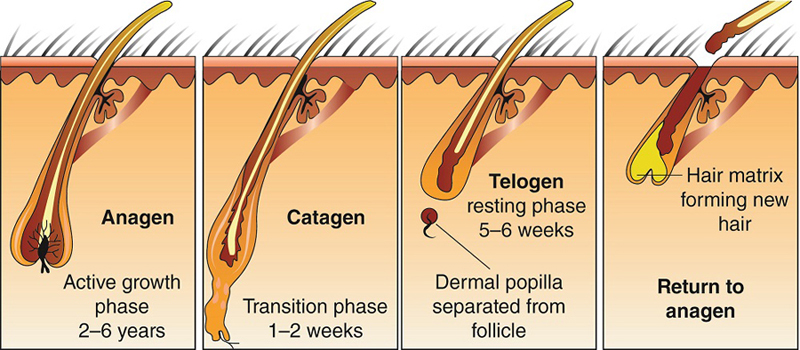
How Hair Grows:Understanding hair growth requires an understanding of the hair growth cycle, which consists of three major stages: anagen, catagen, and telogen. The anagen phase is the active growth stage, which lasts several years and causes hair cells to divide rapidly, resulting in lengthening. The catagen phase lasts around two weeks and is characterized by slowing hair growth and follicle shrinkage. Finally, the telogen phase is the resting stage, lasting about three months, during which hair development ceases and old hairs are lost to make place for new growth.
This cyclical process is regulated by genetics, hormones, age, and overall health, which all influence the rate and quality of hair development.
Nutritional Needs: Biotin, vitamins A, C, D, and E, as well as zinc, iron, and omega-3 fatty acids, are all required for hair development. Biotin, a form of vitamin B, strengthens and encourages hair development, whereas vitamin A stimulates the creation of sebum, an oily fluid that moisturizes the scalp. Vitamin C is essential for collagen formation, which strengthens hair shafts, while vitamin D is required for hair follicle cycling. Vitamin E functions as an antioxidant, preventing hair damage. Zinc aids tissue growth and repair, while iron maintains proper oxygen flow to hair follicles via red blood cells. Omega-3 fatty acids nourish the hair, keeping it glossy and growing healthily. A healthy intake of these nutrients promotes strong and resilient hair development.
Here are some foods which strengthen the hair and promote hair growth:
1.Protein-Packed Foods:

- Lean Meats – Lean meats are essential sources of keratin, the structural protein found in hair. Lean foods like chicken, turkey, and lean cuts of cattle are abundant in protein and contain the amino acids required for keratin formation. These amino acids, particularly cysteine and methionine, serve as keratin building blocks, adding to hair’s strength, structure, and durability.
- Incorporating lean meats into the diet ensures enough intake of these necessary amino acids, which promotes healthy hair growth and helps to avoid hair breakage and loss. Furthermore, lean meats frequently contain other essential minerals such as iron and zinc, which promotes overall hair health.
- Fish – Salmon, mackerel, and other fatty fish contain omega-3 fatty acids, which are necessary for healthy hair. These omega-3s, which include EPA and DHA, nourish hair follicles, boost scalp health, and stimulate hair growth by lowering inflammation and increasing circulation. Omega-3 fatty acids also aid to maintain the scalp’s natural oil barrier, avoiding dryness and flakiness, resulting in stronger, shinier hair.
- Incorporating fatty fish into the diet guarantees a steady supply of these essential nutrients, which promotes general hair health and helps to prevent hair thinning and loss.
- Eggs – Eggs are excellent for hair development due to their high concentration of important nutrients, including protein, biotin, and vitamins. Protein is essential for hair structure since hair follicles are primarily made up of keratin, a kind of protein. Biotin, a type of B vitamin prevalent in eggs, is essential for keratin formation, strengthening hair, and encouraging growth. Eggs also include crucial nutrients including vitamins A and E, which prevent hair from damage and maintain a healthy scalp.
- Incorporating eggs into one’s diet can help to improve overall hair health and growth, making it stronger, thicker, and more resilient.
- Legumes – Legumes like beans, lentils, and chickpeas promote hair growth by delivering a high concentration of plant-based protein, iron, zinc, and biotin. Iron promotes blood circulation to the scalp, ensuring that hair follicles receive enough oxygen and nutrients for growth. Zinc promotes hair tissue growth and repair.
- Incorporating beans into your diet guarantees that these essential nutrients are available to keep your hair healthy and strong, reducing the chance of hair loss and breaking.
2.Vitamin-Rich Foods:
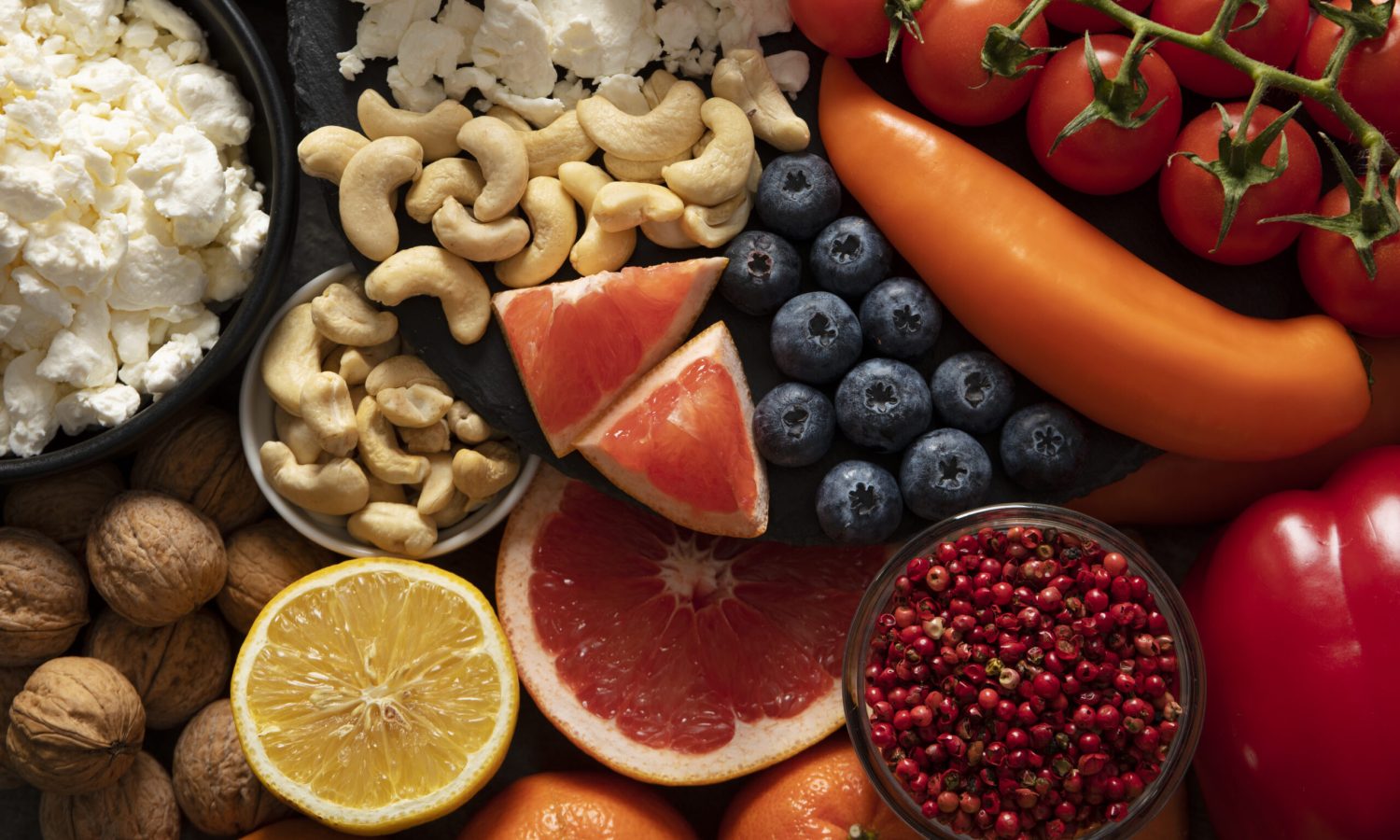
- Vitamin A – Vitamin A is essential for sebum production, which is an oily material generated by the scalp’s sebaceous glands. Sebum functions as a natural conditioner, keeping the scalp moist and preventing hair from becoming dry and brittle.
- Adequate sebum production is necessary to maintain a healthy scalp environment, which promotes hair development and avoids dandruff and dry scalp. Individuals can support balanced sebum production by getting enough vitamin A from their diet, which includes foods like carrots, sweet potatoes, and leafy greens. This generates healthier, shinier, and more resilient hair.
- Foods rich in Vitamin A are – carrots, sweet potatoes, spinach and kale, red and yellow bell peppers, apricots, mangoes, egg yolks, fish oil, fortified dairy products.
- Vitamin C – Vitamin C promotes hair growth by aiding in the creation of collagen, an essential protein that strengthens hair and keeps it from becoming brittle and breaking. Vitamin C, as an antioxidant, protects hair follicles from free radical damage, which can inhibit hair development.
- It also helps with the absorption of iron from the food, which is another important component for good hair growth, as iron deficiency can cause hair loss. Individuals can encourage strong hair health and excellent hair growth by consuming a suitable amount of vitamin C from foods such as citrus fruits, strawberries, bell peppers,etc.
- Vitamin E – Vitamin E is important for hair growth because of its strong antioxidant qualities, which help prevent oxidative stress and free radicals that can damage hair follicles. This vitamin promotes blood circulation in the scalp, increasing the delivery of nutrients and oxygen to hair follicles, encouraging healthy hair development.
- Furthermore, vitamin E helps to maintain the lipid layer of the hair, keeping it hydrated and preventing dryness and breakage. Vitamin E promotes overall hair health by protecting and nourishing the scalp and hair, as well as encouraging strong, healthy hair growth.
- Foods rich in Vitamin E are – Nuts and Seeds like almonds, sunflower seeds, hazelnuts, pine nuts. Oils like sunflower oil, wheat germ oil, olive oil. Fruits and Vegetables like Spinach, broccoli, asparagus,kiwi, avocado, mango,etc.
3.Mineral-Rich Foods:
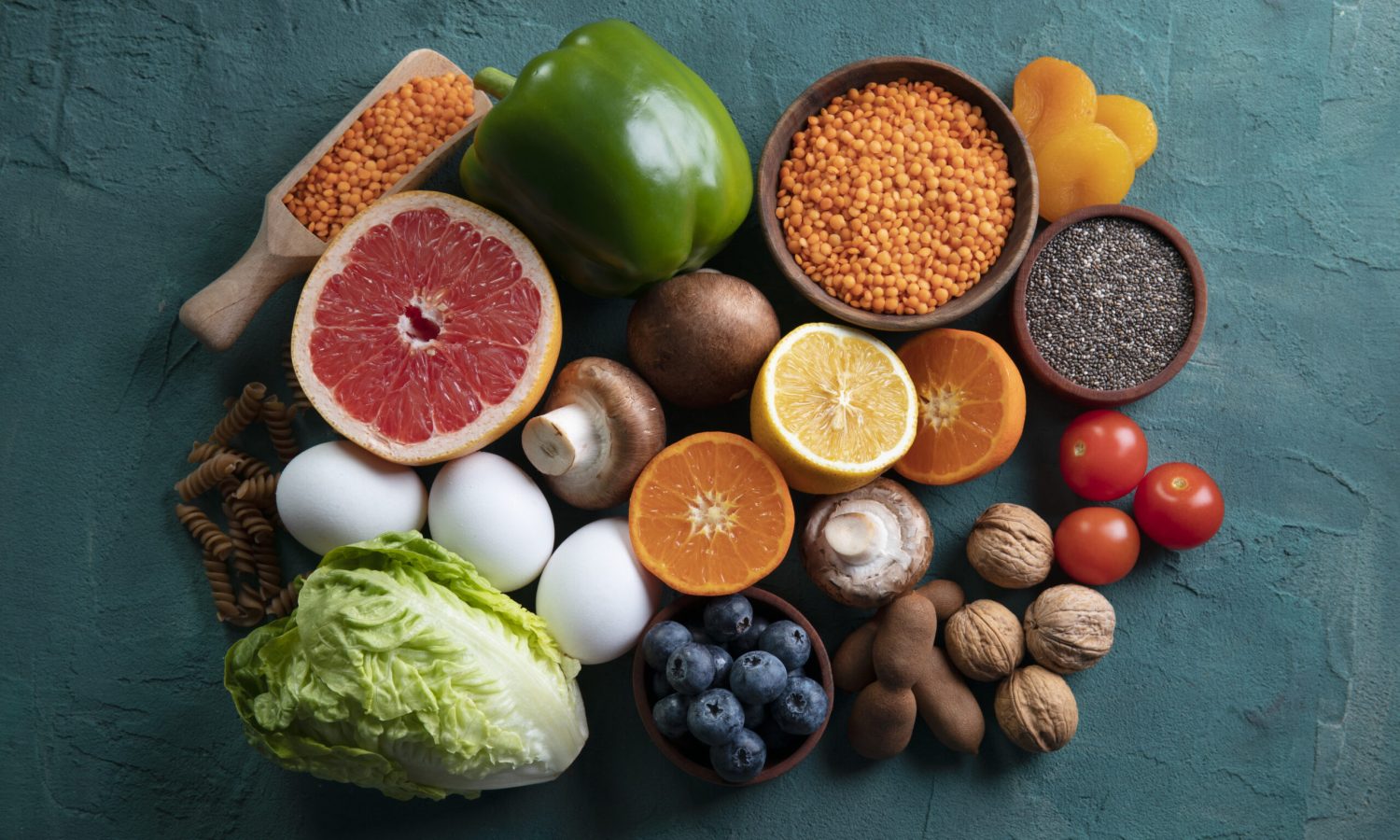
- Iron – Iron promotes hair growth by helping to produce hemoglobin, a component of red blood cells that transports oxygen throughout the body, including the hair follicles. An adequate amount of oxygen is required for cell development and repair, especially in the hair follicles.
- When iron levels are insufficient, a condition known as iron deficiency anemia develops, which lowers the oxygen accessible to hair follicles, potentially causing hair to become fragile, brittle, and more likely to fall out. Thus, keeping enough iron levels is critical for healthy hair growth and avoiding hair loss.
- Foods rich in iron – lean red meats such as beef and lamb,Poultry like chicken and turkey,For plant-based options, consider dark leafy greens such as spinach, kale, and Swiss chard, Legumes like lentils, chickpeas, and beans, as well as fortified cereals and whole grains like quinoa and brown rice, nuts and seeds, particularly pumpkin seeds and sesame seeds.
- Zinc – Zinc promotes hair growth by supporting numerous essential biological mechanisms that affect the health and development of hair follicles. It helps in the synthesis and repair of hair tissue, ensuring that hair grows and regenerates correctly. Zinc is also required for the oil glands that surround hair follicles to work properly, keeping the scalp hydrated and healthy.
- Furthermore, zinc’s role in protein synthesis and cell division promotes the development of strong hair strands. A zinc shortage can cause hair loss and poor hair health, so it’s critical to incorporate zinc-rich foods like pumpkin seeds, oysters, and almonds in your diet for optimal hair growth.
- Foods rich in zinc are – shellfish, beef, chicken, pork, lamb, turkey, pumpkin seeds, hemp seeds, chickpeas, lentils, cashews, Quinoa, yogurt, cheese, mushrooms.
- Magnesium – Magnesium is essential for hair growth since it contributes to a number of biological processes that promote healthy hair. It regulates calcium levels in the body, reducing calcium buildup in hair follicles, which can lead to poor hair growth or loss. Magnesium also helps with protein synthesis, including the formation of keratin, which is the fundamental structural component of hair.
- Additionally, it promotes healthy circulation, ensuring that hair follicles receive the nutrients and oxygen they require for growth. Magnesium promotes strong hair growth by lowering inflammation and stress, both of which have a negative impact on hair health.
- Foods rich in magnesium are – nuts and seeds like almonds, cashews, pumpkin seeds, flax seeds, chia seeds, whole grains like whole wheat, brown rice, quinoa, legumes like black beans, chickpeas, lentils, kidney beans, fruits and vegetables like spinach, kale, swiss chard, collard greens, bananas, avocados, figs, seafood like salmon, mackerel, halibut, other foods like dark chocolate, tofu, yogurt.
4.Omega-3 Fatty Acids:
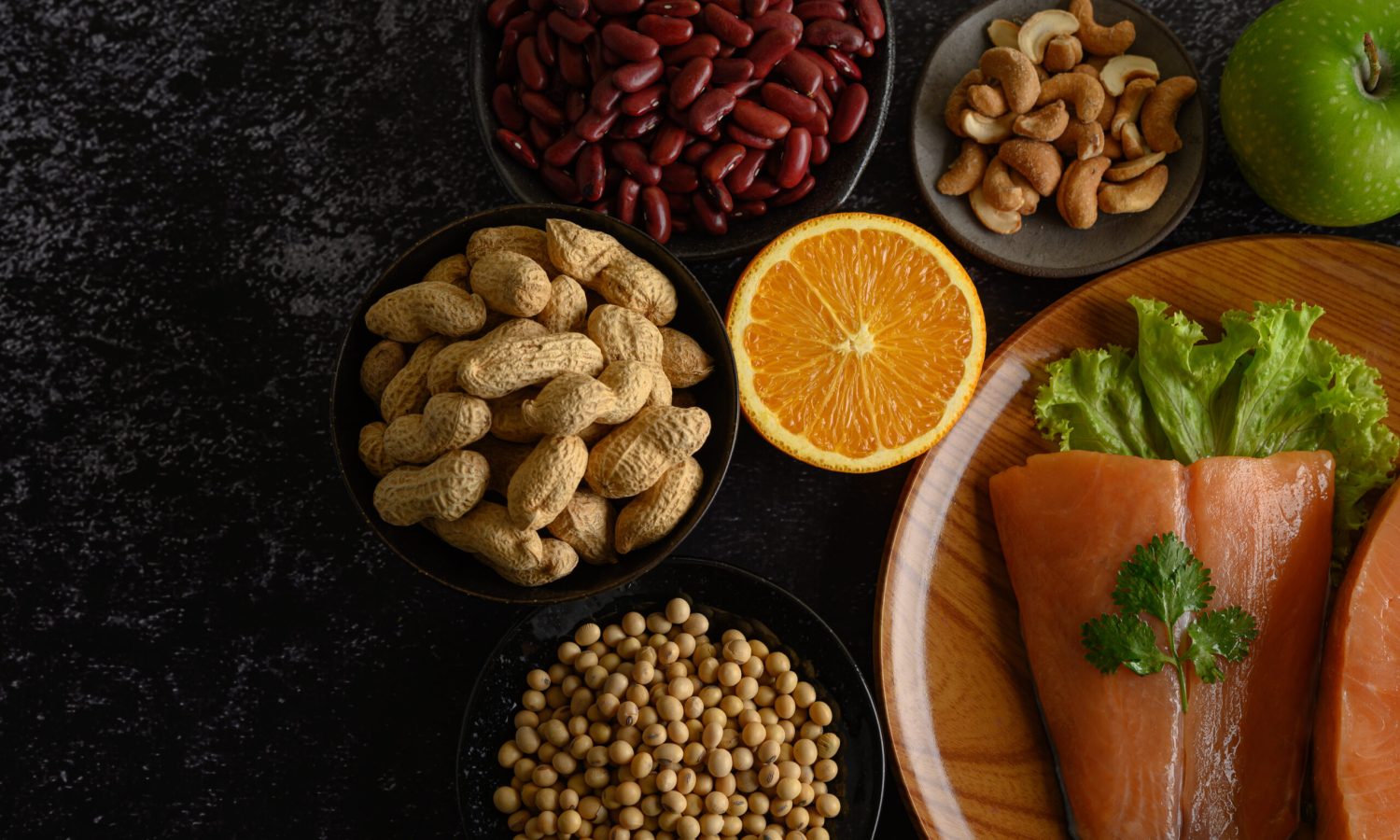
- Omega-3 fatty acids are vital elements that promote hair development and health. These fatty acids, which are mainly found in fatty fish such as salmon, mackerel, and sardines, as well as plant-based sources such as flaxseeds and chia seeds, promote hair development through a variety of processes. First, omega-3s nourish hair follicles by increasing circulation and decreasing inflammation, which can contribute to hair loss.
- They also aid to preserve scalp flexibility, which is necessary for strong and healthy hair development. Omega-3 fatty acids also have anti-inflammatory qualities, which can help open hair follicles and encourage hair growth.
5.Hydration and Hair Health:

- Hydration is important for hair growth because it affects the health of the scalp and hair follicles. When the body is properly hydrated, the scalp stays moisturized, minimizing dryness and flakiness that can inhibit hair growth. Furthermore, appropriate hydration aids in the delivery of crucial nutrients to the hair follicles, increasing their strength and vitality.
- Furthermore, moisturized hair is less prone to breakage and split ends, which allows current hair strands to last longer. Drinking enough of water and eating water-rich foods helps to maintain the ideal moisture balance in the scalp and hair, improving overall hair health and promoting the growth of strong, luscious locks.
- Fruits and vegetables that maintain hydration in the body – cucumber, watermelon, celery, tomato, spinach, strawberries, orange, grapefruit, broccoli, bell peppers, zucchini, coconut water, peaches, cantaloupe.
6.Bonus tips:
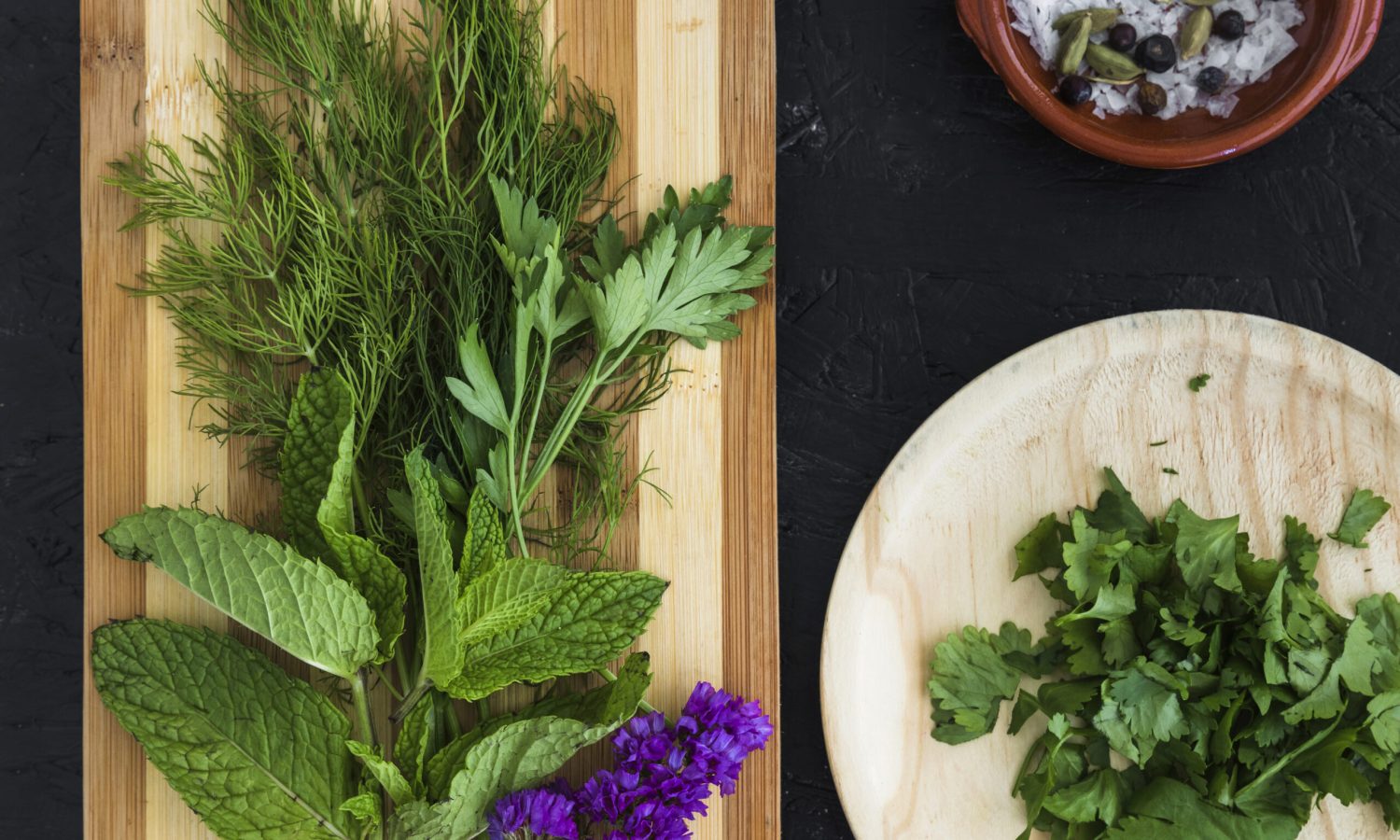
Rosemary and peppermint are both extensively recognized for their capacity to promote hair growth.
Rosemary has been demonstrated to improve scalp circulation, which stimulates hair follicles and promotes growth.. It also has anti-inflammatory effects that can help to soothe and relieve scalp inflammation.
Peppermint oil, on the other hand, has been found to increase the number of hair follicles, resulting in thicker hair growth. It has a cooling impact on the scalp and can help balance pH levels, resulting in an ideal environment for hair development. Both plants include antioxidants, which can prevent hair from damage and premature thinning. When used as extracts or oils in hair care products, rosemary and peppermint can help to healthier, stronger hair with more volume and shine.
Conclusion
Finally, a diet high in particular nutrients is crucial for good hair development. We’ve covered a variety of foods that promote hair health, including protein-rich options such as lean meats, fish, and eggs, which contain critical amino acids for keratin formation. Vitamin-rich meals including carrots, citrus fruits, and almonds promote scalp health and collagen formation. Mineral-rich meals such as spinach, pumpkin seeds, and almonds promote hair tissue growth and repair. Omega-3 fatty acids contained in flaxseeds, chia seeds, and walnuts promote scalp health and hydration. Furthermore, staying hydrated with water-rich foods and fluids is essential. Incorporating these nutrient-dense foods into your diet can help you maintain healthy, beautiful hair.
FAQS
Proteins, vitamins (A, C, D, E, and B-complex), minerals (iron, zinc, selenium), and omega-3 fatty acids are all essential elements for healthy hair. These nutrients help to strengthen hair, promote growth, and improve scalp health.
Yes, hair loss can often indicate nutritional deficiencies. A lack of iron, vitamin D, zinc, and other vital nutrients can cause hair loss and shedding.
Yes, foods high in biotin (eggs, almonds), vitamin E (nuts, seeds), vitamin A (sweet potatoes, carrots), and omega-3 fatty acids (fatty fish) can aid in hair growth.
While a well-balanced diet is the best method to receive the nutrients you need, supplements can help fill in the gaps. However, before beginning any supplement regimen, contact with your healthcare physician to ensure it is safe and appropriate for your needs.
Diets heavy in sugar, bad fats, and processed meals can be harmful to hair health. These foods can cause nutritional deficits and poor scalp health, compromising hair development and strength.
We’d love to hear from you!
Have you tried adding any of these foods to your diet? What results have you observed? Do you have any further methods for naturally increasing hair growth? Kindly share your experiences and suggestions in the comments area below! Your insights can help others achieve healthier, more brighter hair.
STAY HAPPY AND HEALTHY.